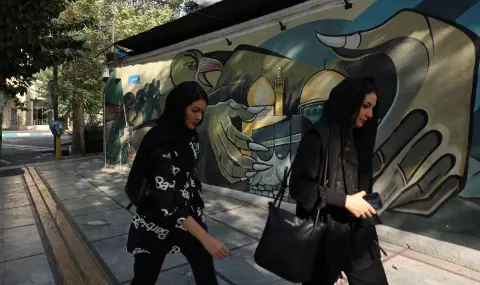Iranian President Massoud Pezeshkian has vetoed the new headscarf law and has appealed to the National Security Council. The head of state hopes that the law will be changed at least in part.
According to the law, proposed by Islamic hardliners in parliament, women will be severely punished if they violate the rules on wearing headscarves. Penalties can include high fines, denial of social services, bans on leaving the country or work, and confiscation of up to five percent of assets. In recent weeks, journalists, teachers and activists have demanded the suspension of the controversial hijab law. According to them, it is "a huge insult" to the population and will have consequences for society.
"The political system is unlikely to back down"
In a debate on the Azad Media platform, created by Sharif University to promote critical thinking, criminal law professor Mohsen Borhani sharply criticized: "With such pseudo-laws, the parliament is dividing society even more". Borhani, who was arrested in 2023 for criticizing the political system and expelled from Tehran University, was able to return to work under President Pezeshkian. Now the lawyer is warning about the consequences of the hijab law, which not only violates civil rights but also undermines trust in religion.
Observers see the dispute over the law as a power struggle between hardliners and more moderates. During his election campaign, President Pezeshkian promised to take a more moderate course.
Pezeshkian is also not ready to understand what women really want, believes human rights activist Fezeh Abdipour. Since the Islamic Revolution in 1979, women have been required to wear headscarves. Now, the new law provides for a drastic tightening of sanctions. Abdipour, who has been arrested several times for her commitment to religious minorities and human rights, emphasizes: "Women in Iran have learned to fight for their freedom and their lives every day. They want to decide for themselves what to wear. But unfortunately, the political system is unlikely to give in".
The situation of women who refuse to wear the hijab is becoming increasingly difficult. "There are morality police patrols in the metro and at intersections, fines and citations for not wearing the hijab," Abdipour reports. A few months ago, her car was confiscated for "violation" of the headscarf requirement. "The fine I had to pay was extremely high," she adds. "Women who speak out publicly or post photos on social media without the hijab are pressured to delete the content, often under threat of legal consequences. Former prisoners like me continue to be persecuted by the security forces."
Society has changed
In Iran's big cities, many women do not comply with the strict Islamic dress code. This trend has only grown since the large protests in the fall of 2022 under the slogan "Woman, Life, Freedom". Conservative politicians such as former Parliament Speaker Ali Larijani, who is close to Ayatollah Khamenei, have also criticized the new hijab law. According to Larijani, this is not the right response to these trends. "We don't need such a law - what we need most is cultural persuasion".
But this strategy is precisely what is failing, says activist Shiva Kianfar. The young woman fled Iran for Germany because of the repression. According to her, the 2022 protests were a key moment. "At the latest, after the nationwide protests, a rethinking has occurred in society. Many families are now siding with women who no longer want to give in." During the protests, Kianfar was arrested and spent several months in the notorious prison in the city of Urmia. "Even there, we refused to wear the headscarf in front of those who interrogated us", she says.
Kianfar and her family paid a high price for her resistance - they were released on bail, but then the pressure continued. For the activist, the women's resistance is an expression of a profound social change. A change that cannot be stopped.
Author: Shabnam von Hein
